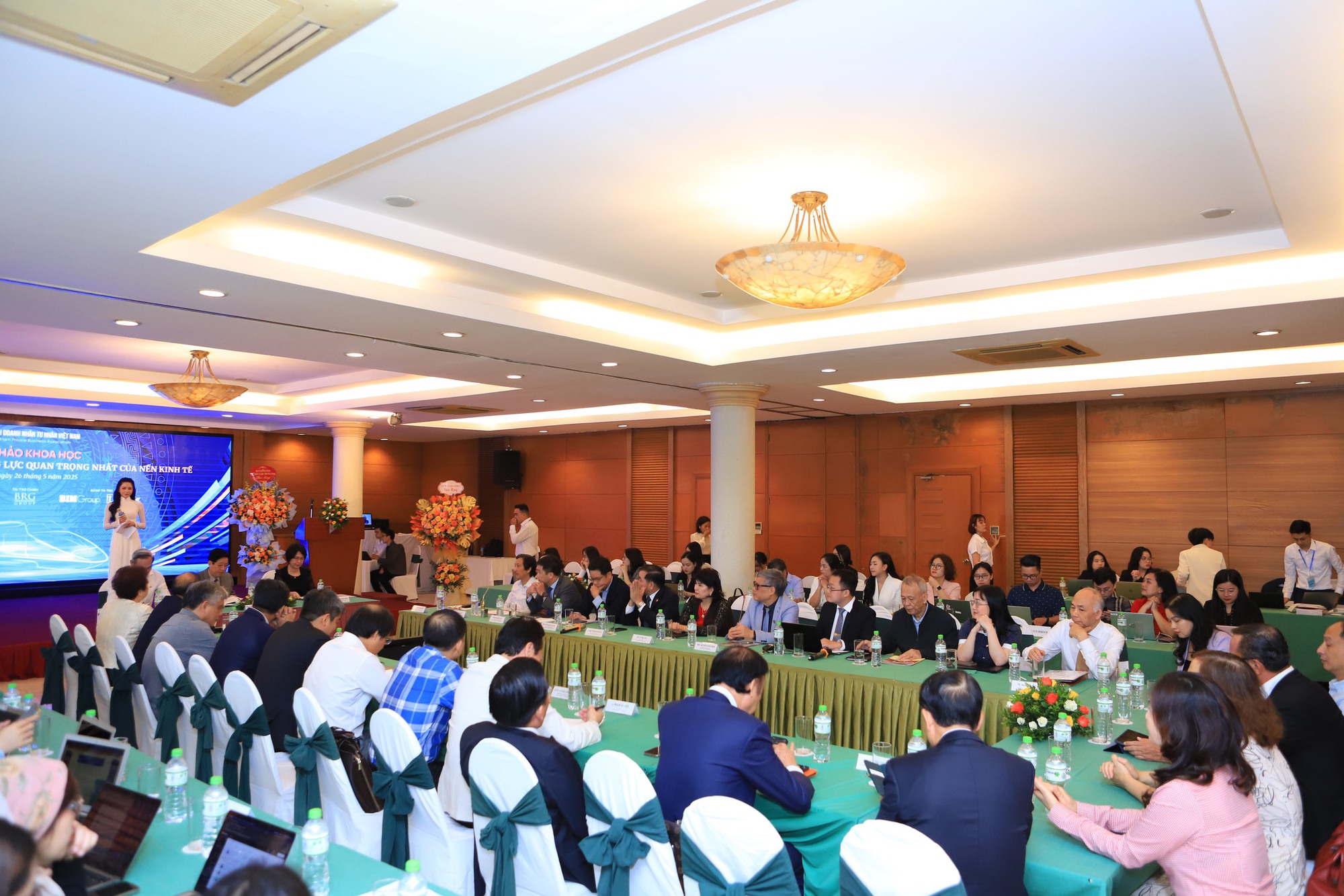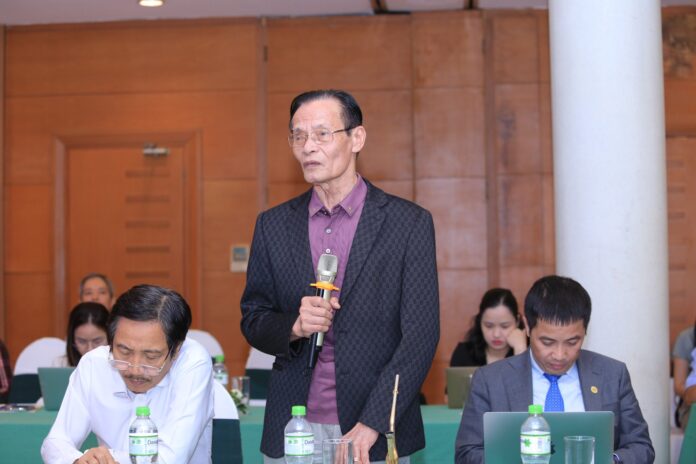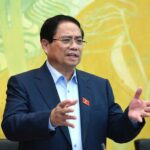On May 26th, the Vietnamese Private Entrepreneurs Association, in collaboration with the Electronic Business Review, hosted a scientific seminar titled “Private Economy: The Most Important Driver of the Economy.”
Speaking at the event, economist Dr. Le Xuan Nghia expressed that the survival and sustainable development of Vietnamese businesses thus far have been through a “narrow path,” and Resolution 68-NQ/TW seems to offer a broader avenue. He hopes that with this new path, the growth of enterprises will be faster and stronger.
However, it is important to consider that a broader path does not necessarily equate to faster and stronger growth. For instance, countries like Thailand, Malaysia, Indonesia, and the Philippines, which have private economies and free markets, do not have as robust economies as South Korea and China, where the state-owned sector surpasses the private sector. This comparison illustrates that even when enterprises embark on a broader path, they may not thrive without supportive government policies.
“While enterprises may experience more freedom on this broader path, achieving the goal of 20 global conglomerates is not a simple task,” said Mr. Nghia. “In addition to untying the knots, we must provide development orientations for businesses to prosper.”

Dr. Le Xuan Nghia – Member of the Monetary and Financial Policy Advisory Council, Former Vice Chairman of the National Financial Supervisory Commission
As an example, Mr. Nghia shared his recent participation in discussions on gold market policies, where diverse opinions were presented. Some argued that Vietnam’s unique culture, with its deep love for gold, necessitates strict control to prevent negative impacts on the macroeconomy. In contrast, businesses expressed their desire to import gold for jewelry production, and savers questioned where they could obtain gold if imports were prohibited.
According to Mr. Nghia, Vietnam has banned gold imports for the past 14 years, so where does the gold currently traded in the country originate? Gold and silver companies have no choice but to collect smuggled gold and gold from the people for processing and trading to stay afloat and employ thousands of workers.
Given this situation, Mr. Nghia believes that the “best solution” to address the gold market’s issues is to open up the market by allowing a few companies to import gold under regulations. These companies would then be required to sell wholesale to gold retail businesses.
The “middle solution,” he suggests, is to permit banks and enterprises to import gold and establish an exchange that sets prices according to regulations. This approach mirrors China’s strategy, where a single exchange directs the domestic gold market to prevent significant deviations from global market prices.
Dismissing concerns about gold imports affecting the exchange rate, the expert emphasized, “There’s no need to worry.” He pointed out that while China’s economy is 40 times larger than Vietnam’s, its foreign exchange reserves are only 25 times higher, at $2.5 trillion compared to Vietnam’s $100 billion.
According to the expert, Vietnam’s annual gold import demand is only about $3-4 billion, while the foreign currency used to import luxury goods like cigars, liquor, and cosmetics also amounts to billions of dollars.
“Gold is an extremely important reserve. Vietnam only needs to import $3-4 billion worth of gold annually, yet many are concerned about ‘foreign currency outflow,’ while the import of foreign liquor, cigars, and cosmetics reaches $8 billion per year, and no one talks about this issue. This is very unreasonable,” questioned Mr. Nghia.
With this example, Mr. Nghia hopes to inspire ideas for legal reform. “The immediate concern is not how enterprises will implement the resolution but how the resolution will be legalized and how discipline will be maintained during implementation,” he explained.
At the seminar, BRG Group Chairwoman Nguyen Thi Nga shared that while the private sector contributes nearly 60% of GDP, it is still at a disadvantage compared to foreign direct investment (FDI) due to less favorable institutional conditions. “FDI accounts for two-thirds of export turnover, but most of it is in low-value-added processing. Meanwhile, the domestic private sector has much room for growth, from large to small and medium-sized enterprises,” said Ms. Nga.
The BRG Group Chairwoman emphasized that to realize Resolution 68-NQ/TW, a comprehensive and systematic process of institutionalization is necessary. The core element is to create a stable legal and policy environment that encourages entrepreneurs to invest and pursue legitimate wealth creation.

Overview of the Seminar
Sharing this view, Dr. Tran Thi Hong Minh, Director of the Institute for Policy and Strategy, Central Policy Committee, stated that the biggest challenge currently lies in institutionalization. If the institutions are not well-designed, they can become barriers and hinder development. “Reforms must start with specific, tangible changes, not just general ideas. Even a small requirement like a criminal record certificate in a business dossier can be a hindrance if not implemented transparently,” Dr. Minh shared.
At the seminar, VCCI Deputy Secretary-General Dau Anh Tuan also pointed out that investment procedures are a significant bottleneck hindering the flow of capital into the economy, especially for land-related projects. He cited a survey showing that 74% of enterprises had to delay or cancel investment plans due to administrative hurdles related to land. With 15 steps and multiple agencies involved, the process is time-consuming and cumbersome.
“After Resolution 68-NQ/TW, there must be determined actions from the Government and the National Assembly to improve the institutions, simplify procedures, and promote a smarter investment environment for the private sector,” emphasized the VCCI Deputy Secretary-General.
The 2024 Budget Revenue Reaches a Record High of Over VND 2 Quadrillion
The Chairman’s statement is a testament to the country’s economic growth and stability. The nation’s budget revenue reflects a thriving economy, with stable macroeconomic conditions that ensure social welfare and improved living standards for its citizens.
The Bidding Law and the Urgent Need for Amendments
As of May 17, 2025, during a group discussion at the National Assembly on the draft Law amending and supplementing a number of articles of the Bidding Law and related laws on public investment, General Secretary To Lam pointed out four critical issues in the current Bidding Law: delaying the country’s development, lowering the quality of projects, wasting resources, and corrupting and losing personnel.
“Don’t Waste Your Wisdom: A Call to Action for the Seasoned Professionals of Today”
“In order to foster private sector growth, Alpha Book’s Chairman, Nguyen Canh Binh, emphasizes the importance of intersecting the talents of individuals from both the private and public sectors. He believes that by intertwining the strengths and resources of these two realms, a robust and dynamic economy can be cultivated.”





















